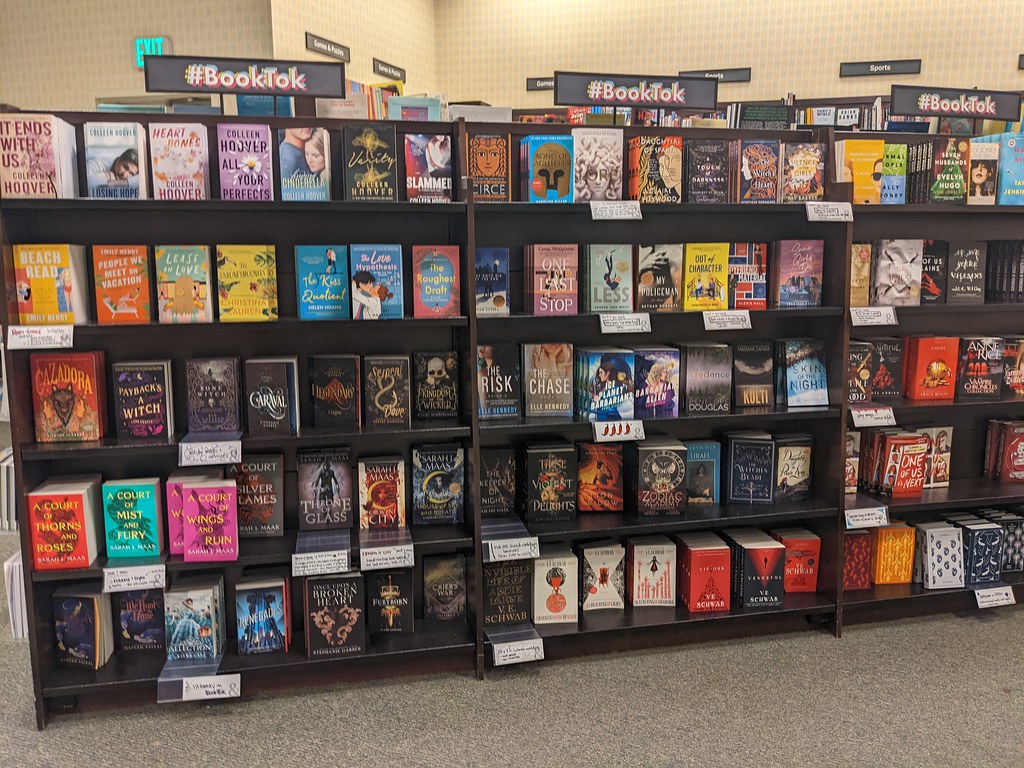
“BookTok” section in Barnes & Noble Booksellers.
.sno-story-photo-area {
width: 100%;
margin-bottom: 0px;
max-width: 100%;
margin-left: auto;
margin-right: auto;
}
.sno-story-photo-area img {
object-fit: contain;
}
.sno-story-photo-area .sno-story-photo-image-area {
height: unset;
max-height: unset;
background: #dddddd;
}
.sno-story-photo-area .sno-story-photo-image-area img {
height: unset;
}
.sno-story-photo-area .sno-story-photo-caption-area,
.sno-story-photo-area .captionboxmittop {
max-width: 100%;
margin-left: auto;
margin-right: auto;
}
@media only screen and (max-width: 600px) {
.sno-story-photo-area .sno-story-photo-caption-area {
padding-left: 20px;
padding-right: 20px;
}
.sno-story-photo-area .sno-story-photo-image-area {
height: unset;
max-height: unset;
}
.sno-story-photo-area .sno-story-photo-image-area img {
height: unset;
}
}
Social media and art can go hand-in-hand, but when TikTok’s “BookTok” algorithm seems to push harmful tropes onto young women, the beauty of reading is distorted. One author is the pinnacle of social media success, while her work is full of harmful ideology: Colleen Hoover.
The popularization of Hoover’s novels on “BookTok” negatively influences the relationship ideals of young women. Because of the short-form style of content on TikTok, the themes of domestic violence written in Hoover’s novels have become watered down by “BookTok.”
While there’s nothing wrong with reading books for pleasure, the way that “BookTok” markets Hoover’s novels tends to simplify or completely ignore how toxic the relationships in her novels are.
Hoover’s “BookTok” notoriety has caused her to quickly rise to the top of The New York Times bestseller list. Her novels are known for their “spicy content” and incredibly toxic romance.
More often than not her novels feature young women in relationships that, in my opinion, are nothing more than abusive and violent. Her most popular novel, which rose to the top of “BookTok” fame and The New York Times bestseller list, “It Ends With Us” is almost a stereotype of her work.
It stands as a testament to how often she casts her female characters as submissive, weak and dependent on their emotionally abusive, violent and controlling male counterparts.
The lesson taught by her novels is that any man, no matter how broken, can be fixed through a woman giving up her autonomy to him. She reinforces harmful stereotypes by showing how empowered her female leads are when they submit to a man. It’s paradoxical at best and dangerous at worst.
“BookTok” creates the perfect environment for these dangerous messages to thrive. I believe that creators who recommend and praise Hoover’s novels are unintentionally turning the complex issue of abuse into a trope.
This sort of messaging is even more harmful when considering the age demographics for Hoover’s novels. While a majority of her novels are considered 17-21+, she has published some in the 14+ range that include the same heavy topics.
The age demographic she is marketing to are impressionable young women who are shaping their idea of romance. Girls as young as 14 should not be recommended novels that use abuse as a crutch to drive tension in a plot line. It was surprising to learn that the aforementioned “It Ends With Us” is considered to be a young adult romance novel.
Young women should not be taught to shape their lives around what their partner wants of them. It seems that Hoover’s best literary work places her female leads in a role where their only option is to orbit around the men in their lives.
“BookTok” has only encouraged romanticizing the violent relationships featured in Hoover’s novels. This glorification of abuse, especially to a younger audience, has the opportunity to normalize domestic violence. From what I have seen, this is something “BookTok” creators do not take into account when recommending Hoover’s novels.
There is a time and place to unpack complicated stories that involve domestic abuse. That place is not within the pages of a young adult romance novel.
